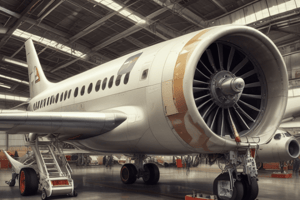Podcast
Questions and Answers
What is the primary requirement for electrochemical corrosion to occur?
What is the primary requirement for electrochemical corrosion to occur?
- High temperatures
- Exposure to a chemical agent
- Presence of an electrolyte (correct)
- Contact between three metals
Which type of corrosion results from improper heat treatment of certain aluminum alloys?
Which type of corrosion results from improper heat treatment of certain aluminum alloys?
- Filiform corrosion
- Galvanic corrosion
- Crevice corrosion
- Intergranular corrosion (correct)
Which statement accurately describes the use of aluminum oxide paper?
Which statement accurately describes the use of aluminum oxide paper?
- It is only suitable for wood surfaces.
- It should be used exclusively on metal surfaces.
- It can safely be used on most surfaces. (correct)
- It is dangerous to use on any surface.
What type of coating provides a protective film to bare metal and prevents further corrosion?
What type of coating provides a protective film to bare metal and prevents further corrosion?
What is the primary effect of salt on an aircraft's exterior?
What is the primary effect of salt on an aircraft's exterior?
What is the first step in assessing corrosion limits?
What is the first step in assessing corrosion limits?
Which cleaning agent is most suitable for light cleaning of aircraft surfaces?
Which cleaning agent is most suitable for light cleaning of aircraft surfaces?
What could be a consequence of using an alkaline cleaner on lap joints in sheet metal?
What could be a consequence of using an alkaline cleaner on lap joints in sheet metal?
Which non-destructive testing method utilizes fluorescent dyes for surface examination?
Which non-destructive testing method utilizes fluorescent dyes for surface examination?
What is a recommended method for drying an aircraft after washing?
What is a recommended method for drying an aircraft after washing?
Which substance indicates volatility and is particularly relevant in the context of painting?
Which substance indicates volatility and is particularly relevant in the context of painting?
Which method should be avoided when cleaning plastic surfaces on an aircraft?
Which method should be avoided when cleaning plastic surfaces on an aircraft?
What common paint issue is caused by dirt or moisture causing imperfections in the finish?
What common paint issue is caused by dirt or moisture causing imperfections in the finish?
What type of cleaning agent is best for removing carbon deposits and corrosive stains in the cabin area?
What type of cleaning agent is best for removing carbon deposits and corrosive stains in the cabin area?
What should be done when switching from sanding one type of metal to another?
What should be done when switching from sanding one type of metal to another?
When cleaning aircraft tires, which type of cleaner is recommended?
When cleaning aircraft tires, which type of cleaner is recommended?
Flashcards are hidden until you start studying
Study Notes
Aircraft Exterior and Corrosion
- Salt acts as an electrolyte, compromising the protective oxide layer of an aircraft's exterior.
- Chemical corrosion arises from direct exposure of bare surfaces to caustic substances.
- Electrochemical corrosion occurs when dissimilar metals are in contact with an electrolyte, requiring an anode, cathode, an electrical path, and electrolyte.
Cleaning Agents
- Solvents: Heavy-duty cleaners (e.g., MEK) for tough stains.
- Emulsion Cleaners: Heavy-duty cleaners effective for heavy deposits.
- Soaps: Gentle, non-toxic, and non-flammable for light cleaning.
- Synthetic Detergents: Non-soap cleansers, non-toxic and non-flammable.
Cleaner Usage Guidelines
- Use cleaners according to the maintenance manual to prevent damage.
- Alkaline cleaners may cause corrosion in lap joints of sheet metal components.
- Select cleaners that can be rinsed and neutralized to prevent corrosion.
Aircraft Washing Methods
- Wet Wash: Utilizes alkaline and emulsion cleaners; removes oil, grease, and carbon deposits but not corrosion.
- Dry Wash: Employs dry cloths to eliminate dust and small dirt accumulations.
- Polishing: Restores shine to painted surfaces and removes oxidation without affecting paint.
Cleaning Techniques
- Avoid stiff brushes or coarse rags during exterior cleaning.
- Oil or exhaust stains should be removed with solvents like kerosene.
- Dry aircraft using chamois, synthetic wipes, or absorbent cotton.
Plastic Surface Care
- Do not rub plastic surfaces with dry cloths or use abrasive materials.
- Clean gently with a wet cloth and mild soap; harmful products can soften plastic and cause cloudiness.
Aircraft Tires Maintenance
- Clean with mild soap and water to remove contaminants like oil and fuel.
- After cleaning, lubricate all grease fittings and hinges.
Chemical Cleaning Agents
- Alkaline cleaners are water-soluble and present no fire hazard.
- Acid solutions effectively remove carbon deposits and corrosive stains in cabin areas.
Cleaning Metal Surfaces
- Use a fresh sanding pad for different metals to avoid contamination.
- Aluminum wool comes in coarse, medium, and fine grades.
- Aluminum oxide paper should be 300 grit or finer and safe for most surfaces.
Types and Limits of Corrosion
- Corrosion Types: Surface, pitting, galvanic, crevice, filiform, intergranular, exfoliation, stress, and fretting.
- Corrosion Limits:
- Negligible damage
- Repairable by patching
- Repairable by insertion
- Necessitating part replacement
Non-Destructive Testing (NDT) Methods
- Magnetic particle inspection
- Dye penetrant inspection
- Visual inspection
- Eddy current inspection
- Ultrasonic inspection
- Radiographic inspection
Corrosion Detection Methods
- Visual inspection
- Dye penetrant inspection
- Magnetic particle inspection
- Eddy current
- Ultrasonic inspection
- X-ray inspection
Corrosion Prevention Techniques
- Conversion Coating: Forms a protective film on bare metal to prevent corrosion.
- Sacrificial Coating: Applies a more reactive metal, which corrodes faster (e.g., cadmium).
- Anodizing: Involves dipping aluminum in an acid bath and applying electric current.
- Alclad: Coating of pure aluminum over aluminum alloy.
Additional Key Terms
- Volatility: Indicates how readily a substance vaporizes.
- Flash Point: The lowest temperature at which a material can ignite.
- Application Methods: Finishes can be applied by dipping, brushing, or spraying.
- Zahn Cup: Instrument for measuring paint viscosity.
- Common Paint Issues: Fish-eye, sanding scratches, and wrinkling.
Studying That Suits You
Use AI to generate personalized quizzes and flashcards to suit your learning preferences.



